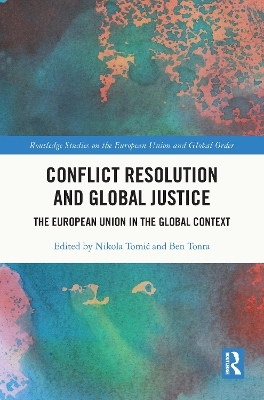
Conflict Resolution and Global Justice
Routledge (Verlag)
978-1-032-04805-5 (ISBN)
This book examines how the different normative foundations of conflict resolution held by various global actors, their understandings of justice, and the differences between types of conflict influence the varying means by which conflicts can be prevented, managed, and ultimately resolved.
By combining insights from political theory, conflict studies, and European Union (EU) foreign policy studies, the book identifies the EU as the key case of a conflict manager that is both a product and a defender of a global liberal order. It focuses on three aspects of conflict resolution that pose their own sets of both normative and empirical dilemmas: resolving border disputes; strengthening the resilience of weak or divided states and societies after regime change, and intervention in humanitarian crises. Furthermore, it offers a comparative analysis between a potentially distinctive European approach and that of other global actors and reflects critically on situations where policy practice may not always reflect a concern for justice, asking what countervailing forces prevail and why.
This book will be of key interest to scholars and students in European and EU Studies, Area studies, Conflict Resolution, War Studies, EU Foreign Policy Political Theory, International relations as well as policymakers.
Nikola Tomić is Adjunct Research Fellow at the School of Politics and International Relations, University College Dublin, Ireland. Ben Tonra is Professor at the School of Politics and International Relations, University College Dublin, Ireland.
1. Introduction PART 1: Resolving and managing border disputes 2. Recognition, reproduction, transformation: The use and abuse of international justice in the Cyprus conflict 3. Conceptions of justice underpinning Europe’s policies towards the Israeli-Palestinian conflict 4. Between border dispute and ethnic conflict: The EU as a just mediator in the Serbia-Kosovo stalemate 5. Russia’s approach to conflict resolution through the prism of international justice PART 2: Resolving and managing regime changes and power vacuums 6. Libya and the EU 7. The (In)Justices of peacekeeping: EUFOR Tchad/RCA 8. Peacekeeping and security through the African Union 9. India on global justice issues of United Nations peacekeeping and peace building: A case study of the Democratic Republic of Congo 10. A Brazilian way of peacekeeping? A normative and empirical analysis of Brazil’s contributions, challenges, and contradictions 11. Conclusion
| Erscheinungsdatum | 08.11.2021 |
|---|---|
| Reihe/Serie | Routledge Studies on the European Union and Global Order |
| Zusatzinfo | 2 Tables, black and white; 6 Line drawings, black and white; 6 Illustrations, black and white |
| Verlagsort | London |
| Sprache | englisch |
| Maße | 156 x 234 mm |
| Gewicht | 380 g |
| Themenwelt | Recht / Steuern ► EU / Internationales Recht |
| Sozialwissenschaften ► Politik / Verwaltung ► Europäische / Internationale Politik | |
| Sozialwissenschaften ► Politik / Verwaltung ► Politische Theorie | |
| Sozialwissenschaften ► Soziologie ► Spezielle Soziologien | |
| ISBN-10 | 1-032-04805-0 / 1032048050 |
| ISBN-13 | 978-1-032-04805-5 / 9781032048055 |
| Zustand | Neuware |
| Haben Sie eine Frage zum Produkt? |
aus dem Bereich


